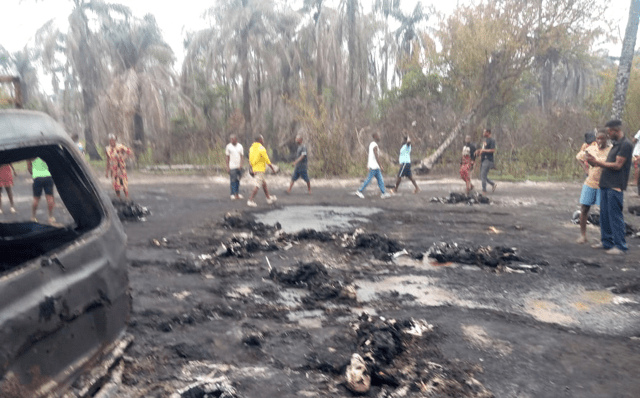In a reaction to the recent incident that led to the loss of about 100 lives, some civil society organisations (CSOs) represented by Nnimmo Bassey (Health of Mother Earth Foundation – HOMEF), Ken Henshaw (We the People), Akinbode Oluwafemi (Corporate Accountability and Public Participation Africa – CAPPA), Prince Chima Williams (Environmental Rights Action/Friends of the Earth Nigeria – ERA/FoEN), Emem Okon (Kebetkache Women Development Resource Centre), Auwal Musa Rafsanjani (Civil Society Legislative Advocacy Centre – CISLAC), Betty Abah (CEE-HOPE) and Tijah Bolton-Akpan (Policy Alert), in this statement called on the authorities to adopt long-lasting measures towards addressing inherent challenges

On April 23, 2022, another artisanal refining site in the Niger Delta exploded, killing over 100 persons and injuring dozens. The explosion, which occurred near Ohaji-Egbema local government area of Imo State, on the border with Rivers State, also burnt off large sections of the adjoining forest, seriously impacting the environment and wildlife. It is sad that thousands of oil fires continue to occur in Nigeria since the tragic pipeline fire at Atiegwo, near Jesse, on 18th October 1998 that led to the death of 1082 citizens.
As civil society organisations concerned about the lives, livelihoods, and environment of the people, we are deeply concerned that in recent times, these explosions have become more regular and routine.
In October 2021, no less than 25 persons including children were killed when an artisanal refinery exploded in Rumuekpe community of Rivers State. More recently on April 11, 2022, buildings used in the storage of artistically refined petroleum products exploded and burnt for days at the Bonny-Bille-Nembe jetty in Port Harcourt, killing five persons including a pregnant woman and a two-month-old baby.
Despite the regularity of these explosions and the gory deaths, the last three years have witnessed worsening ecological disasters in the Niger Delta on account of illegal artisanal refineries.
After each gruesome incident, government officials are quick to make statements promising to stamp out illegal refineries and provide better security. In the same manner, President Muhammadu Buhari has described this explosion and the fatalities as “catastrophe and a national disaster”, promising to find and prosecute the sponsors of the illegal activities.
We note however that, beyond the statements of condemnation and condolences, government at the state and federal levels have consistently failed to diligently examine the key factors that drive the proliferation of artisanal refineries despite the exposure of their operators to fatalities.
Artisanal refineries have grown and expanded principally because government has failed in its responsibilities to provide meaningful engagement for the people, adequately address the prevailing poverty and protect the network of oil installations in the Niger Delta region.
It is noteworthy that the two states affected in this latest artisanal refinery explosion incident – Imo and Rivers – rank among the highest in unemployment in Nigeria, according to the National Bureau of Statistics. It is also important to note that benefit transfer schemes established by successive governments to address the endemic unemployment and poverty in the region, including the 13% derivation policy, the Niger Delta Development Commission, etc., have all failed to address the economic challenges the people of the region face. A point in reference is the open and endemic corruption which continues to plague the Niger Delta Development Commission (NDDC).
The poverty in the region has been compounded by the ecological devastation which has accompanied almost 70 years of ruthless and mindless oil extraction. The millions of barrels of crude oil routinely spilled into the rivers, swamps and lands of the region, and the constant flaring of associated gas have rendered the lands, forests, and rivers unproductive, making traditional income generating vocations of the people unviable.
While we call on the government to take steps to stop the spate of illegal artisanal refining in the region, we are mindful that this should not be seen as a new opportunity to further entrench the militarisation of the region and abuse community rights. It is also important to mention that irrefutable evidence points to the active complicity of law enforcement officers in establishing and running artisanal refineries and by extension oil theft and the so-called third-party interferences.
Some law enforcement officers do not only grant operational permits for artisanal refiners to operate freely for a fee, but they are also known to facilitate all aspects of the operations, and in some instances, own and operate their own artisanal refineries.
While we recognise that the recourse to artisanal refining of petroleum products for sale in the local market is a desperate response to the poverty and destitution in the region as well as non-functional refineries, we nonetheless condemn it, especially as it is fast becoming a key cause of death among youths in the region, and a major source of pollution.
We however call on the government to go beyond the usual military response it always prefers in the Niger Delta, and immediately address other factors that make risking death by roasting seem like the best available survival alternative for the people of the Niger Delta.
